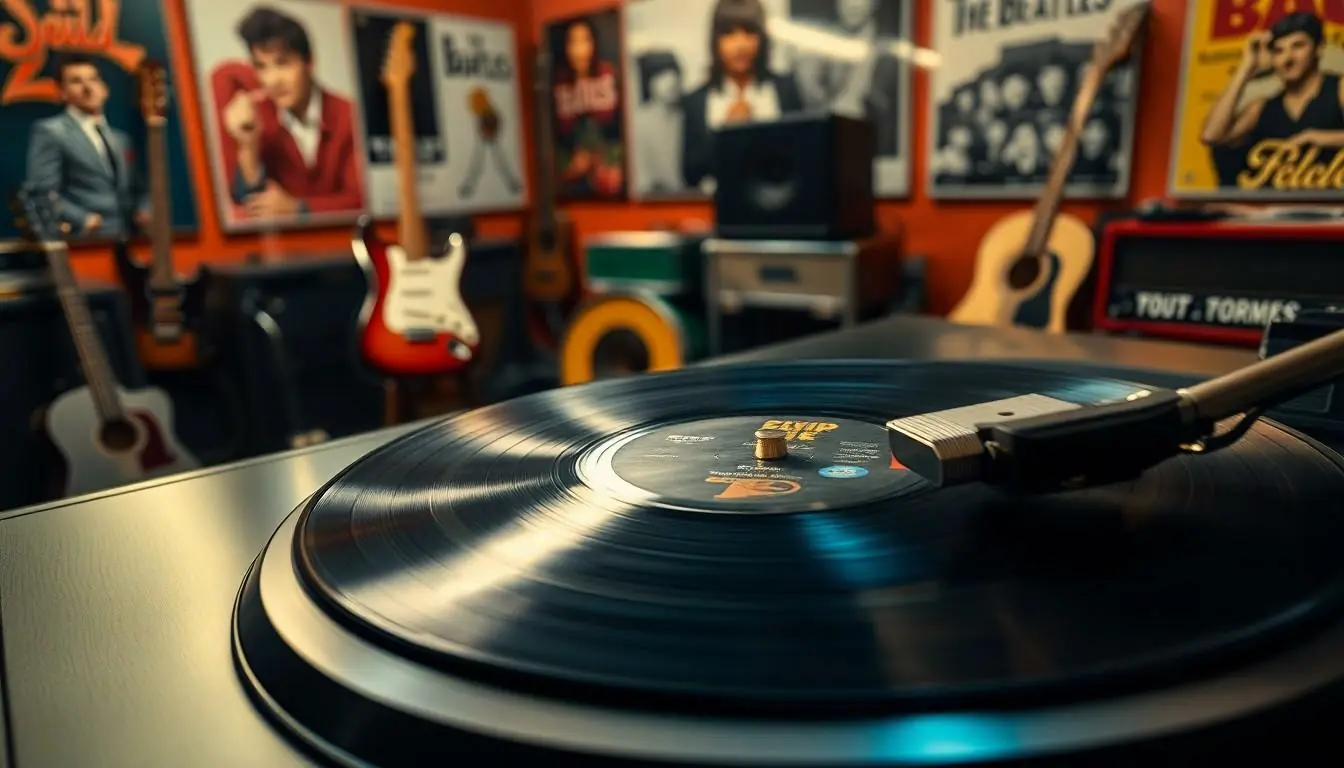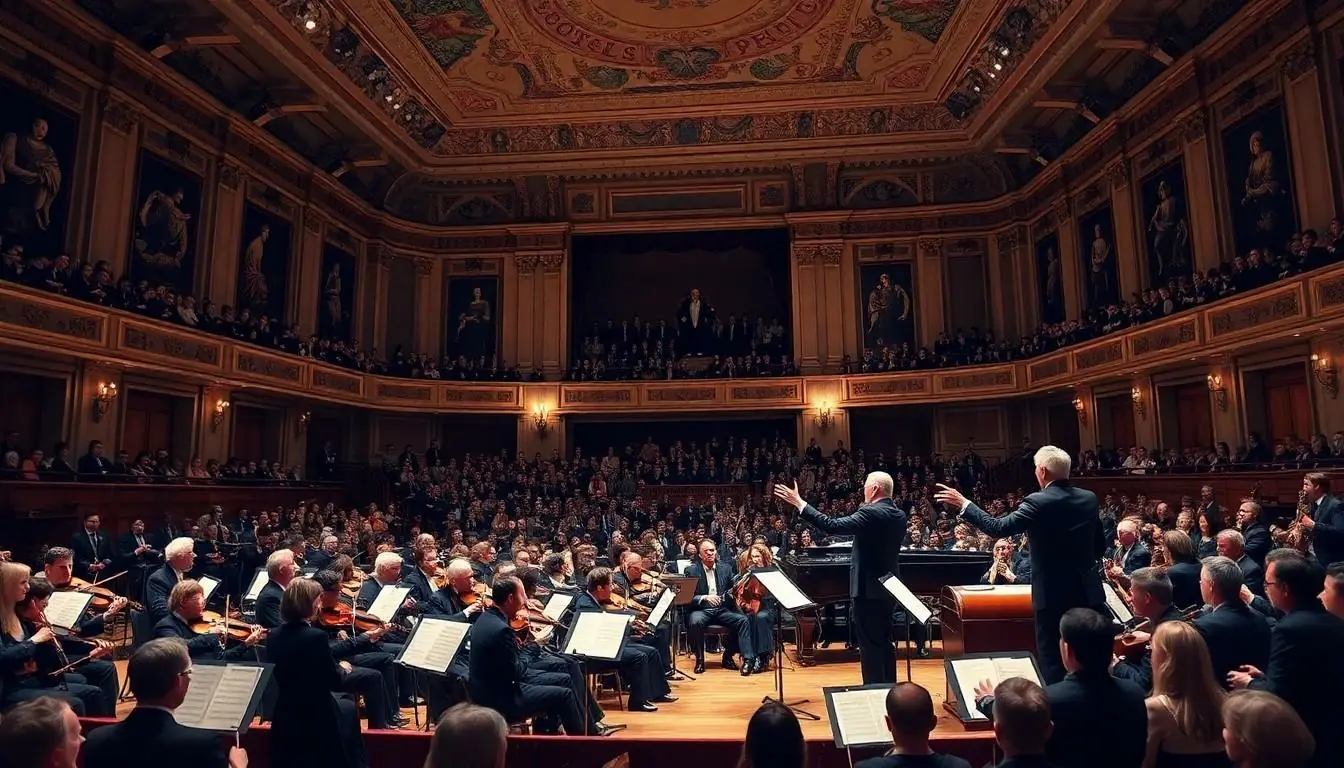Pop music is everywhere, from catchy jingles in commercials to chart-topping hits that get stuck in your head for days. But have you ever stopped to wonder who actually invented this earworm genre? It’s a question that sparks debates hotter than a summer hit single. While some might argue it was the Beatles with their mop-topped charm, others might point to Elvis shaking things up.
Table of Contents
ToggleThe Origins of Pop Music
Pop music’s roots intertwine with diverse musical elements, reflecting its dynamic evolution. Understanding its origins requires examining early influences and key genres.
Early Influences on Pop Music
Diverse musical styles laid the groundwork for pop music. Jazz introduced improvisation, while rhythm and blues brought soulful melodies. Folk music also played an essential role, enriching lyrical content. Artists such as Chuck Berry and Buddy Holly helped bridge these genres with catchy choruses and vibrant tunes. The combination of these influences led to a sound that resonated with a broad audience, paving the way for the pop genre’s emergence.
Key Genres that Shaped Pop Music
Several genres significantly influenced pop music’s development. Rock and roll established a rhythmic foundation, attracting youth culture in the 1950s. Disco, thriving in the 1970s, added a danceable beat and glamor. Meanwhile, electronic music introduced innovative sounds and production techniques in the 1980s. These genres contributed unique characteristics, culminating in the creation of pop music that captures listeners’ imaginations to this day.
Notable Figures in Pop Music History

Pop music’s evolution closely intertwines with influential songwriters and producers. They shape trends, create hits, and drive the genre forward.
The Role of Songwriters
Songwriters often create the foundation for pop music’s appeal. Great examples include Max Martin, who crafted chart-topping songs for artists like Britney Spears and Taylor Swift. Another notable figure is Carole King, whose songwriting artistry gave rise to timeless hits in the 1970s. Also, Burt Bacharach’s collaborations with artists like Dionne Warwick transformed the musical landscape. Their contributions demonstrate that strong lyrics and memorable melodies play crucial roles in defining pop.
The Impact of Producers
Producers significantly influence pop music’s sound and direction. Timbaland revolutionized production techniques, working with artists like Justin Timberlake and Nelly Furtado to blend genres. Similarly, Quincy Jones’ work with Michael Jackson created iconic albums that reshaped the industry. Moreover, Pharrell Williams continues to define contemporary pop with his innovative beats. Each producer’s unique vision repeatedly alters pop music’s landscape, contributing to its ongoing evolution.
Defining “Pop Music”
Pop music represents a genre characterized by its broad appeal, designed for commercial success. The catchy melodies and relatable themes often draw listeners in.
Characteristics of Pop Music
Pop music features memorable hooks and easily digestible structures. Vibrant melodies create sing-along potential. Lyrics typically focus on universal themes such as love, relationships, and personal experiences. Upbeat tempos drive engagement and encourage movement. Production techniques often involve polished instrumentation and extensive use of technology, ensuring a radio-friendly sound.
Pop Music Across Decades
Pop music evolved significantly throughout the decades. The 1960s introduced the British Invasion with bands like The Beatles dominating charts. The 1970s saw the rise of disco, blending dance beats with pop sensibilities. Transitioning into the 1980s, electronic influences emerged, as synth-pop defined the sound of the era. The 1990s brought diversification, with boy bands and pop princesses like Britney Spears shaping youth culture. Each decade contributed distinct styles and innovations, continuously expanding the genre’s richness and reach.
Who Invented Pop Music?
Pop music’s origins spark debate, with several prominent figures often credited as pioneers. Individuals like Elvis Presley and The Beatles significantly shaped the genre, popularizing its sounds and styles worldwide. They introduced elements that captivated audiences and transformed music culture.
The Argument for Various Pioneers
Elvis Presley stands out as a key figure in pop music, merging various genres into a distinctive sound. The Beatles revolutionized pop with innovative songwriting and studio techniques, setting new standards for the genre. Additionally, Chuck Berry’s influence on rock and roll bridged gaps between rhythm and blues and pop. Others, such as Buddy Holly, helped establish the singer-songwriter model within pop music. Each of these artists laid critical groundwork, making it challenging to pinpoint a single inventor.
Cultural and Historical Context
Pop music emerged in the early 20th century, evolving from a mix of diverse influences. The genre reflects cultural shifts, integrating elements from jazz, gospel, and folk traditions. Elvis Presley popularized rock and roll in the 1950s, paving the way for subsequent movements. The British Invasion introduced a new wave of creativity in the 1960s, further shaping pop music’s trajectory. As society changed, pop music grew in complexity, mirroring trends and sentiments from disco in the 1970s to electronic influences in the 1980s.
Pop music’s journey is a testament to its ability to evolve and adapt over time. While the debate over its true origin continues to spark discussion among music enthusiasts, it’s clear that various artists and genres have played pivotal roles in shaping what pop music is today. From the groundbreaking contributions of legends like Elvis and The Beatles to the innovative techniques of modern producers, each has left an indelible mark on the genre.
As pop music continues to reflect changing societal trends and cultural influences, its rich history serves as a reminder of the creativity and collaboration that define this beloved genre. The future of pop music remains bright as new artists emerge and push boundaries, ensuring that its legacy will endure for generations to come.




